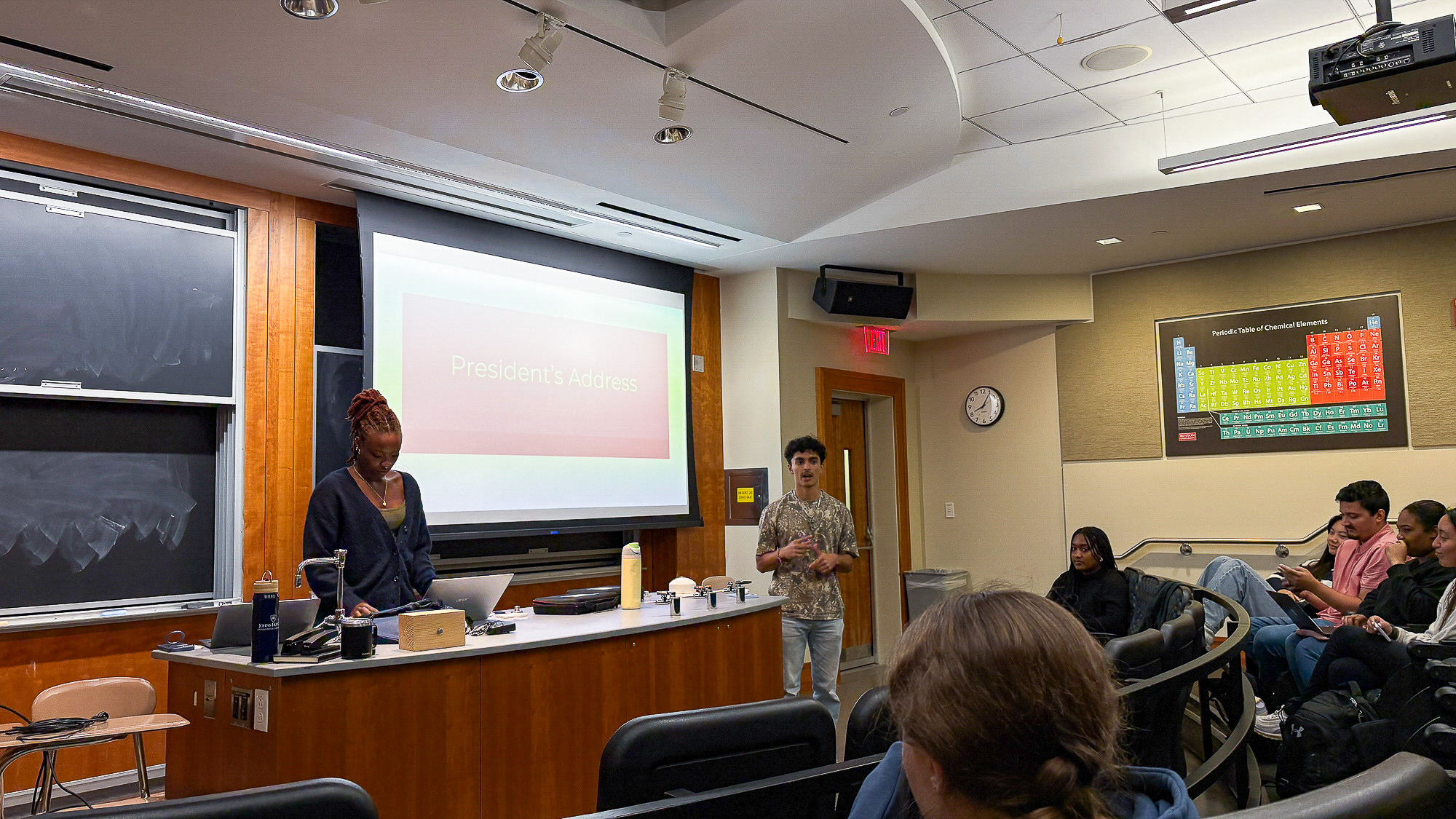The Boston University Student Government executive board, BridgeToBU, is working to improve transparency, accessibility and community on campus despite administrative restructuring.

(SIENA GLEASON)
BridgeToBu, elected last year in a student election cycle with record-breaking turnout, campaigned on four main objectives: Community, Outreach, Response and Empower.
Each objective ties to the larger goal, “building bridges” on campus to unite the BU community, said BridgeToBu Vice President of Finance Hanna Yilma. StuGov aims to build three bridges this year: a bridge between student communities, a bridge between students and administration and a bridge between administration and StuGov, Yilma said.
StuGov plans to connect different student communities by hosting events.
“We have such a lovely, diverse community here, but often students exist in these silos of isolation,” Yilma said. “So we want to host events … to bring different cultures and different communities together to all enjoy the same events.”
In the past there was a “disconnect” between University administration and the student body, Yilma said.
This year, the executive board has gone to greater lengths to communicate with administration, such as hosting monthly town hall meetings that allow StuGov leadership and BU administrators to communicate directly with students. The town halls are new this semester, and have never been done before.
StuGov hosted its first town hall meeting in September. The next meeting is scheduled for Oct. 28.
The executive board will also be meeting with University President Melissa Gilliam and has invited deans of BU’s colleges to speak directly to student leadership at StuGov senate meetings.
BridgeToBU Executive Vice President Tony Wu said the executive board’s biggest accomplishment this year is “redesigning” StuGov to make it more accessible to students.
This includes proactively reaching out to students and improving transparency, collaboration and advocacy, Wu said.
Yilma added that each student in a StuGov leadership position is holding office hours for students at least once a week this semester.
“We’re not trying to come across as … a bunch of pre-law students doing this for a resume boost,” she said. “If I have not made myself accessible to students, I’m failing at my job.”
The executive board has continued its communications rebranding effort to stimulate community engagement, with a 160% increase in engagement on Instagram.
However, their accomplishments are not without challenges.
Over the summer, administration centralized resources by merging the Student Activities Office and Community Service Center to create the Student Leadership and Impact Center. This eliminated the StuGov Senate’s role in directly allocating funds to student organizations.
In the past, if student organizations made a mistake in their budget requests, did not receive sufficient funds or had their request denied by the Allocations Board, student organizations would go to the Senate for funding. Now, the Senate can no longer directly fund the club, leaving clubs scrambling for funding.
StuGov President Matthew Feliciano said the allocation board is strict about budgeting mistakes, which can put a burden on students in new leadership positions to “figure it out” with no safety net. Filling out a budget application is a confusing process, especially for those in first-time leadership positions, Feliciano said.
“We’ve just seen that not work in the past, and the Senate was a way to help those students,” he said.
However, Yilma said the change will push StuGov to support student organizations more directly by collaborating to help them utilize their resources.
“It’s going to push us to seek out more in-depth routes of helping out students and helping out student organizations, and not just giving them the money,” she said.
Beginning this semester, the StuGov Events Department and the Campus Activities Board merged to form the StuGov Campus Activities Board.
CAB Co-Director Kate Dougherty said the change was made to consolidate funding and event ideas that overlapped in the past.
With this change, CAB will have a larger staff and budget to plan events, Dougherty said.
“We’re able to fulfill that goal of really providing students at BU opportunities at low cost or of no cost that they wouldn’t otherwise have,” she said.
The board has yet to accomplish its most ambitious campaign promise, the Spring Festival.
The Spring Concert that StuGov hosts annually does not attract much of the student body, Feliciano said.
Instead, the executive board plans to rebrand the event as a festival, with a “vibe” more similar to Coachella, he said.
The festival will feature food, games and student entertainment groups, Feliciano said, to “make this feel like this is a BU event, not just a concert that the student government is semi-funding.”
In all, StuGov will continue to put students at the forefront of their work, Wu said.
“We want to reimagine how student government works and how we can actually be a student-led government for the students,” he said.



















































































































